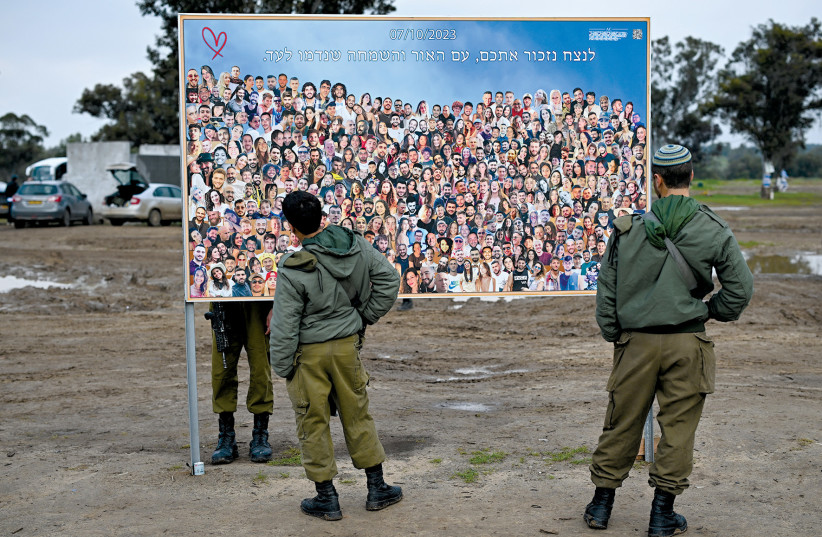Israel is facing isolation in the international arena. Across the board, in all disciplines and professions, from the hard sciences to the liberal arts to the business and hi-tech world and in medicine, the Jewish state has been turned into a pariah.
It began when Israel responded to the brutal Hamas massacre. Isolating Israel is not new, but of late, we are witness to a change in momentum.
From the signing of the first historic Abraham Accords in September 2020 until October 7, Israel was privy to a surge of diplomatic and business opportunities within the Arab world. Even a deal with Saudi Arabia was on the horizon.
And then, boom: October 7. On that day, things changed. Some actually suggest that one of the goals of the Hamas attack that day was specifically to torpedo a Saudi/Israeli deal.
Isolating Israel will hurt the world
Truth is, isolating Israel will hurt the world more than it will hurt Israel. The world is a better place because of Israel. Better because of its interaction with so many of the countries, places, institutions and companies around the world. Science, literature, dance, music, computers, medicine, technology – the list can go on and on – have benefited from Israel’s innovations and inventions. From Israeli daring and Israeli drive; from Israel’s fortitude and Israel’s friendship.

On the most simplistic of levels, the world will suffer from the simple act of refusing to interact with individual Israelis. Israelis love to travel. Israelis love learning from and contributing to the cultures around them and around the world. And from their travels have come great bonds, continued friendships and fruitful collaborations.
And then came October 7. After Israel began to defend itself, many of these relationships began to fray and even disappear. For many, Israel as “the victim” was acceptable, but Israel as the defender, as the fighter, became a much more difficult image to accept.
IN JANUARY, a business intel company called Moring Consult published its results of a favorability study about Israel between September and December of 2023.
Not surprisingly, support for Israel has dropped significantly since the war against Hamas. Net favorability dropped globally by an average of 18.5 percentage points between September and December, decreasing in 42 out of the 43 countries polled. The only county where it did not drop was the United States.
Countries that occupy significant space on the world stage went from viewing Israel positively to having a negative view. China, South Africa and Brazil, as well as several Latin America countries to name a few.
Japan, South Korea and the United Kingdom, countries already fostering a negative view of Israel, displayed significant declines. Net favorability in Japan, for instance, declined from -39.9% to -62.0%, in South Korea from -5.5% to -47.8%, and in the United Kingdom from -17.1% to -29.8%.
The long history of Israeli isolation in the international community has not hindered the amazing growth in the small Jewish state. And Israel should not make policy decisions based on how the world will interpret it or whether or not it will be perceived positively or negatively. Israel must make decisions based on its own best interests, especially when it comes to defense. National security, above all, must be based on the best interests of the country, not on those of personalities from within Israel or those weighing in from abroad.
Even after October 7, it is naivete to think that the world-at-large would adopt a more positive attitude toward Israel than toward Hamas. Look no further than that august international body known as the United Nations, the majority of whose members are not in agreement with either the United States or with Western world ideals. They cannot possibly, by extension, understand or sympathize with Israel.
IN THE 1960’s, the G77 was created. Their common denominator was that each member country was either a former colony or a very poor developing country or both. Today they number 134 nations and are the largest block in the UN. They were the force behind UN resolution 3379 on November 10, 1975, proclaiming that Zionism is Racism.
The vote was 73 in favor, 35 against and 32 abstentions.
At the time, Daniel Patrick Moynihan was the US ambassador to the UN. He delivered a passionate speech in defense of Israel and democracy, a speech that then US secretary of state Henry Kissinger wanted him to mute and tone down. Kissinger thought the speech was too aggressive and would further alienate the United States, but Moynihan carried on as planned. In Moynihan’s eyes, he was defending Israel and democracy.
Before the vote, the ambassador declared: “The United Nations is about to make antisemitism international law.” In his speech against resolution 3379, Moynihan declared that the United States “does not acknowledge, it will not abide by, it will never acquiesce in this infamous act... A great evil has been loosed upon the world.”
Israel will continue to fight. Israel will continue to be productive and creative, even if the international community shuts its doors and pulls in their welcome mats.
Israel is acting justly in its war against Hamas.
True friends will stand by Israel. Those who hate Jews and hate Israel are using this war against Hamas as an excuse to continue to hate Jews and hate Israel.
Israel may be isolated, but Israel will soldier on. It is the world that will suffer the greater loss – of that, I have no doubt.
The writer is a social and political commentator. Watch his TV show Thinking Out Loud on JBS.
